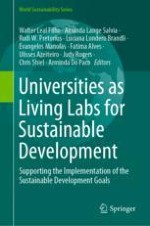2020 | OriginalPaper | Buchkapitel
Adventure Cards, Process Wheels, and a Vision for Digital Storytelling: Learning from Leonardo
verfasst von : Paul J. Wolff III
Erschienen in: Universities as Living Labs for Sustainable Development
Aktivieren Sie unsere intelligente Suche, um passende Fachinhalte oder Patente zu finden.
Wählen Sie Textabschnitte aus um mit Künstlicher Intelligenz passenden Patente zu finden. powered by
Markieren Sie Textabschnitte, um KI-gestützt weitere passende Inhalte zu finden. powered by
